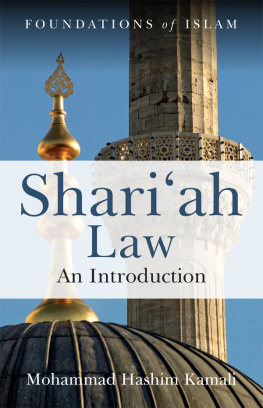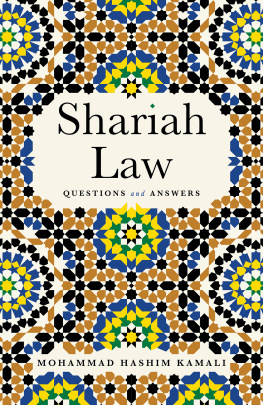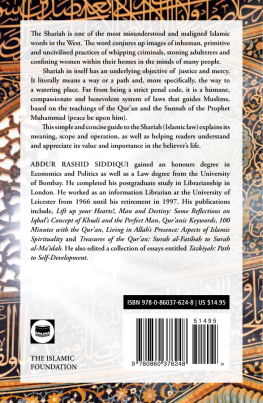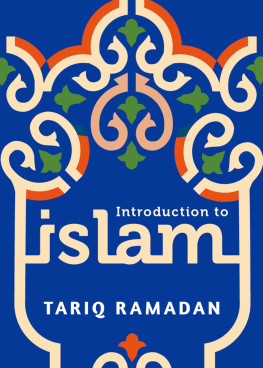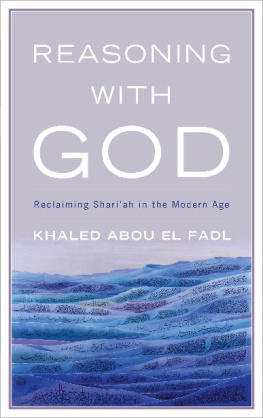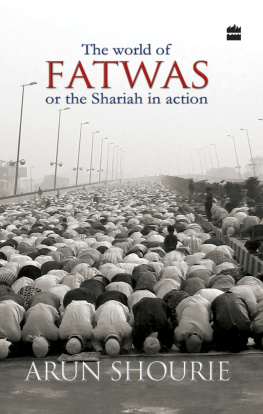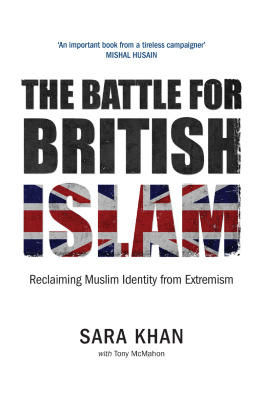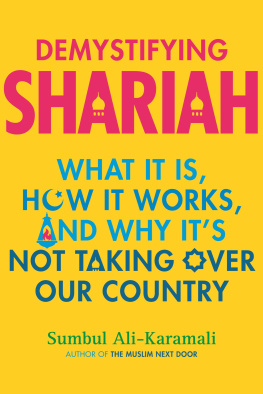Shariah Law
Shariah Law:
An Introduction
Mohammad Hashim Kamali

Oneworld Publications
Published by Oneworld Publications 2008
Reprinted 2010
This ebook edition published by Oneworld Publications 2011
Copyright Mohammad Hashim Kamali, 2008
All rights reserved
Copyright under Berne Convention
A CIP record for this title is available
from the British Library
ISBN 9781780740379
Typeset by Jayvee, Trivandrum, India
Cover design by Design Deluxe
Oneworld Publications
185 Banbury Road
Oxford OX2 7AR
England
Learn more about Oneworld. Join our mailing list to find out about our latest titles and special offers at:
www.oneworld-publications.com
FOREWORD
The term Shariah, often translated as Islamic law, is among the most hotly debated and contested of Islamic ideas both among Muslims and more recently as part of a political discourse in the West. Yet all too often, we seem to be talking past one another. The great masters of Shariah often seem ill-prepared to convey the nuances and origin of this foundational Islamic discourse to a wide audience. At the same time, there is also a xenophobic perspective in the West that seeks to collapse the Shariah into a trans-historical, reified notion that stands for all eternity in opposition to gender equality, democracy, and all that (allegedly) stands at the centre of Western consciousness. Rare have been the scholars who can speak with insight and authority about the Shariah to a wide audience. That is, until Mohammad Hashim Kamali.
Dr. Kamali is virtually peerless in his lucid and thorough presentation of Shariah. He manages to stay clear of the usual problematic presentations, and indeed transcends them. He begins by problematising the usual presentation of Islam as a religious tradition that is legalistic and ritualistic, as well as a timeless and eternal presentation of Shariah. Instead, he looks at the origin, historical development, and contemporary debates about the nature of Islamic law in an imaginative, meticulously documented, yet accessible format. After reading this volume, the reader will be informed not only about the important sources of the Shariah such as the Quran and the example of the Prophet, but also about the methodology whereby Islamic rulings are extracted from those sources.
In todays world, intimate knowledge about Islam and Muslims is not a luxury, but a matter of mutual survival. We, Muslim and non-Muslim, are in desperate need to come to know one another intimately. The Shariah is not the whole of Islam there is also mysticism and philosophy and Quran and piety and poetry and much more but it is one of the foundational discourses of Islam. The series that this book inaugurates is committed to introducing the widest audience possible to the Foundations of Islam in a way that is simultaneously authentic, profound, and accessible. And no one is more worthy of beginning the series than the great contemporary scholar, Mohammad Hashim Kamali.
Omid Safi
Series Editor for Foundations of Islam
PREFACE
Notwithstanding its title of Shariah Law: An Introduction this volume provides a progressive and graduated treatment of the Shariah. The first three chapters offer an introductory discussion which expounds the sources of Shariah, its characteristic features, as well as its leading schools and madhhabs. The succeeding four chapters on ikhtilaf (juristic disagreement), the maqasid (goals and objectives), legal maxims, and ijtihad (independent reasoning) take the discussion a step further, and the approach here is not necessarily confined to introductory and descriptive treatment of the subject. From then onwards the discussion is taken to a more advanced level in its treatment of the Shariah and the principle of legality, Shariah and democracy, and the role and place of Shariah-oriented policy (siyasah shariiyyah) in our understanding of the Shariah.
By revisiting the history and methodology of maqasid in Issues. This chapter is divided into five sections, beginning with a discussion of the secularist debate concerning Islam and the Shariah, then the decline of madrasah, followed by gender equality issues, suicide bombing, and what we can learn, on a more general note, from the Quranic principle of wasatiyyah (moderation and balance) on the issues of our concern.
I take this opportunity to record my appreciation for the help I have been generously given by Mrs Salmah Ahmad of the International Institute of Islamic Thought and Civilisation (ISTAC), my research assistant Nirwan Syafrin, and my colleagues and students at ISTAC and the Ahmad Ibrahim Faculty of Law. I would also like to thank the library staff at ISTAC and the main library at the Gombak campus of the International Islamic University Malaysia. Finally, I am grateful to Professor Omid Safi, Oneworld Publications series editor, for his reading of the manuscript and valuable suggestions. If there are any remaining weaknesses, they are my own work, but I hope, nevertheless, that this volume will meet its desired purpose of providing a balanced and readable handbook on Shariah which also relates meaningfully to issues of contemporary concern to the readers in this discipline.
MHK
1
INTRODUCTION
This chapter begins with advancing a perspective on the origins of Shariah in the Quran and the formative stages of its development in the early decades of Islam. Attention is also drawn in following paragraphs to the overly legalistic tendency which the latter-day Muslim jurists (mutakhkhirun) have embraced at the expense sometimes of the spirit of Islam, its moral and devotional teachings on matters of personal conduct. This tendency is manifested in the way authors have expounded the relationship of law and religion so that the Shariah is often presented as the core and kernel of religion and the essence of Islam itself. The late Joseph Schacht (d. 1969) actually described the Shariah in these words. So the tendency to overlegalize Islam is common across the board in the writings of both Muslims and Orientalists. I believe this to be an exaggeration which does not find support in our reading of the Quran and Sunnah, as I shall presently explain. It is questionable whether Islam was meant to be as much of a law-based religion as it has often been made out to be. The same tendency is noted in relationship to the role of state and religion in Islam. Hence an attempt is also made in the following paragraphs to explore the idea of an Islamic state (dawlah Islamiyyah), its origin and related developments, and in this context I have drawn attention especially to the doctrine of siyasah shariyyah (Shariah-oriented policy) and the role it ought to play in the understanding of an Islamic polity and state. This is followed by an overview of more recent writings on caliphate and Islamic state. The last section of this chapter consists of brief summaries and provides an inkling of what the reader should expect under the various chapters that constitute the bulk of this volume. A slightly different summary of the book also appears in my Conclusion at the end of this volume.
THE ORIGINS OF SHARIAH
Shariah literally means a way to the watering-place or a path apparently to seek felicity and salvation. The word occurs only once in the Quran and it is used in contradistinction with

